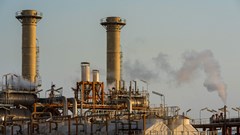China May Exempt Some US Goods From Tariffs as Costs Rise
(Bloomberg) --
China’s government is considering suspending its 125% tariff on some US imports, people familiar with the matter said, as the economic costs of the tit-for-tat trade war weigh heavily on certain industries.
Authorities are considering removing the additional levies for medical equipment and some industrial chemicals like ethane, the people said, asking not to be identified discussing private deliberations.
Officials are also discussing waiving the tariff for plane leases, the people said. Like many airlines, Chinese carriers don’t own all of their aircraft and pay leasing fees to third-party companies to use some jets — payments that would have become financially ruinous with the additional tariff.
The possibility of some goods being exempted boosted investor optimism, as shares in Asia rose and the yuan erased losses.

“It’s another step toward a de-escalation of the trade war,” Kok Hoong Wong, head of institutional equities sales trading at Maybank Securities Pte, said, attributing strength in Hong Kong, Chinese and Japanese stocks to the report. While most don’t expect the US and China to set aside their differences quickly, he said “it would appear the worst may truly be over.”
The exemptions China is mulling mirror similar moves on the part of the US, which excluded electronics from its 145% tariff on Chinese imports earlier this month. The pullbacks reflect how deeply intertwined the world’s two biggest economies are, with some key industries grinding to a halt after the trade war escalated.
“A couple of our member companies have reported that even within the last week, they had a few shipments that were imported that did not have tariffs levied on them,” Michael Hart, president of the American Chamber of Commerce in China, said during a press conference on Friday in Beijing. “It does look like both governments are looking carefully and don’t want to stop trade overall.”
While the US imports far more from China than the other way around, Beijing’s move spotlights the areas of its economy that remain reliant on US goods. China is the world’s largest plastics manufacturer but some of its factories depend on ethane, which is mainly imported from the US. And its hospitals rely on advanced medical equipment like magnetic resonance imaging and ultrasound machines made by US firms like GE Healthcare Technologies Inc.
China’s Ministry of Finance and General Administration of Customs didn’t respond to requests for comment.

The list of exemptions is still in flux and discussions may not progress. Companies in vulnerable sectors have been asked by authorities to submit the customs codes of US goods that they need to be exempt from the new tariffs, other people familiar with the matter said. At least one Chinese airline has been notified that payments to aircraft leasing companies located in free trade zones will not be subject to the new levy, one person said.
Traders have also been circulating purportedly tariff-exempt lists of customs codes that correlate to key chemicals and chip-making components. Bloomberg News could not independently verify the lists.
Beijing is also preparing to waive additional tariffs on at least eight semiconductor-related products, Caijing reported Friday, citing anonymous sources. Those categories don’t include memory chips for the time being, the outlet said, in a potential blow to Micron Technology Inc., the world’s No. 3 memory chipmaker.
What Bloomberg Economics Says...
“Exempting critical, hard-to-replace US products from tariffs would be a pragmatic approach that could ease tensions with the US and serve the interests of Chinese industry. Anything that helps lower the temperature in the trade war is also beneficial from the perspective of avoiding broader clashes with the US.”
— Chang Shu and Eric Zhu
Read the full note here.
Investors are looking for signs that the two countries will engage to lower tariffs, but relations appear to still be at a standstill. On Thursday, Chinese officials publicly demanded the US revoke all unilateral tariffs before agreeing to trade talks. President Donald Trump has tried to get President Xi Jinping on the phone since he returned to office, but the Chinese leader has, so far, resisted, pushing instead for lower-level talks to work out a deal.
On the US front, Trump’s administration has exempted smartphones, computers and other electronics from its so-called reciprocal tariffs — a major reprieve for global technology manufacturers including Apple Inc. and Nvidia Corp., though potentially a temporary one. The exclusions apply to smartphones, laptop computers, hard drives and computer processors and memory chips as well as flat-screen displays.
(Updates with market reaction in the fourth paragraph, analyst and Amcham comments in fifth and seventh.)
©2025 Bloomberg L.P.
KEEPING THE ENERGY INDUSTRY CONNECTED
Subscribe to our newsletter and get the best of Energy Connects directly to your inbox each week.
By subscribing, you agree to the processing of your personal data by dmg events as described in the Privacy Policy.
More gas & LNG news

Spain Wants EU to Keep Methane Goals in Search for LNG Supplies

Booming Power Demand Means Longer Wait for GE Vernova Customers

US Widens Sanctions on Iran to Target Lucrative Gas Exports

China Stops Imports of US LNG Amid Trade War, Custom Data Shows

China’s Shipowners Seek to Continue Talks With US on Levies

EU’s Costa Says Russian LNG Phase-Out Makes Room for US Supplies

Fracker Liberty’s Profit Falls to 3-Year Low as Oil Slumps

Uniper and Woodside sign LNG supply agreements

Vista Buys Petronas’ Argentina Oil Stake in $1.5 Billion Deal
















